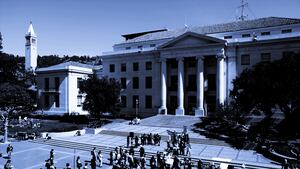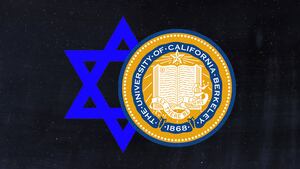The birthplace of the “Free Speech Movement”—the University of California-Berkeley—is having a free speech problem. But this isn’t about “woke” students shutting down what they consider offensive expression; it’s about an overabundance of administrative caution—that could end up chilling legitimate political dissent.
In September, the school’s chancellor called for faculty feedback on a draft report jointly composed by an academic senate-administration workgroup. The document suggests restricting department-wide statements that are “political” in nature—despite concluding “that it is not possible to distinguish between ‘political’ and other statements.”
In order to uphold “civility” and minimize “reputational risk to the institution,” the report advises departments at Berkeley to issue such statements “sparingly” and, if they do so, to include a list of each individual endorser.
That’s pretty vague, right? One would expect guidelines on “political” statements to more clearly lay out what makes a statement “political.” And what amount is “sparingly”?
In a response published on Sept. 22, the Berkeley Faculty Association (BFA) criticized the workgroup for its muddled definition of what constitutes “political” expression—which diverges from UC policy’s historical interpretation of “political” speech as that concerning electoral politics—and noted that the draft is at odds with the University Committee on Academic Freedom and University of California’s Academic Council (both of which have supported less restrictive recommendations).
The co-chairs of the workgroup, in an email conversation with The Daily Beast, emphasized that the guidelines seek to “protect the right to make statements on controversial or political issues,” but to do so “without damaging community or encouraging speech that harms individuals or groups.”
Maintaining that entities—such as schools or departments—do not share the same free speech or academic freedom rights as individuals, they suggested that such entities taking political positions could lead to “someone’s views being silenced or misrepresented, and thus their academic freedom… being violated.” The co-chairs insist that “faculty or staff, of course, can take positions on any issues—individually and collectively.”
But for professors, who are so often caught in the crosshairs of online culture wars—and particularly non-tenured faculty, who are especially vulnerable to termination or sanction for their expression—adherence to this guideline could pose a speech-chilling choice in practice: either refrain from endorsing remotely political statements or potentially compound the specters of harassment and job insecurity.
As BFA chair James Vernon told The Daily Beast, considering that doxing has become a prevalent political tool, “in a way, providing a list of signatories is really just providing a long list of targets for political groups on either side to go after individuals.” Such a guideline, too, fails to account for “very real asymmetries of power” within departments and, thus, could pressure junior faculty to “sign onto a majority viewpoint or a minority viewpoint in ways that could really make them…vulnerable when it comes to future decisions about their employment.”

Demonstrators protest in favor of abortion rights on the steps of Sproul Hall on the UC Berkeley campus on March 8, 2022, in Berkeley, California.
Justin Sullivan/GettyRegarding the report as symptomatic of a financial model depending increasingly on revenue from tuition fees and private philanthropy over public funding, Vernon referred to it as a clear attempt “to foster a view of the university as a type of corporation whose employees cannot damage its reputation, as opposed to a university…in the public domain where faculty and students can likewise articulate what is in the public interest.”
Notably, the workgroup offers only one Berkeley faculty statement as a “clear” case of the sort of speech with which it is concerned: a collective expression of solidarity with the Palestinian Feminist Collective, signed last year by roughly 120 gender studies departments, including Berkeley’s Department of Gender and Women’s Studies.
The statement, supporting Palestinian rights and condemning actions of the state of Israel, seems to have, in part, prompted the workgroup to convene in the first place. According to the draft report, it was “perceived by some” to have run afoul of Berkeley’s Principles of Community, which extol a commitment to “expression and dialogue that elicits the full spectrum of views held by our varied communities.”
But the Gender and Women’s Studies department by no means stifled opposing viewpoints by signing and publicizing the statement. However, in summoning a workgroup (at least in part) due to the department’s endorsement and singling it out in the report, Berkeley seems to have deepened the notion of the Palestine exception to free expression—which so often operates under the pretense of “uncivil” Palestinian advocacy.
It’s particularly disheartening to hear such appeals to “civility,” a favorite weasel word of those intent on policing the bounds of acceptable speech, made by the institution that once housed the now-celebrated Berkeley Free Speech Movement (FSM) of the 1960s.
In 1964 and 1965, the FSM mobilized against McCarthy-era restrictions on on-campus political expression. Asserting their rights to freedom of speech and academic freedom, the student protestors eventually succeeded in eliminating such restrictions and inspiring similar campus movements across the country.
On the losing side of this struggle were those aghast at the supposed incivility of student demonstrators. As New York University professor Robert Cohen writes in The Free Speech Movement: Reflections on Berkeley in the 1960s, to the opponents of the FSM and broader New Left, “the FSM pioneered a new and ultimately destructive style of mass student action,” which “politicized the university and ended the reign of civility within the college gates.”
Berkeley now embraces the movement in its branding (see: the Free Speech Movement café on campus, for example), but its deference to nebulously defined “civility,” as conveyed in the draft report, more closely mirrors that of the FSM’s foes.
And the draft is not Berkeley’s first turn away from the admirable spirit of the FSM. In 2014, then-chancellor Nicholas Dirks circulated a school-wide email in which he described freedom of speech and civility as “two sides of a single coin” and took issue with speech that is “inherently divisive, controversial and capable of arousing strong feelings.”
As the message became widely publicized, its irony was not lost on observers, who castigated such historically short-sighted appeals to civility.
Amid the clamor, some FSM veterans responded, making it plain that it was “precisely the right to speech on subjects that are divisive, controversial, and capable of arousing strong feelings that we fought for in 1964.” The draft report, with its resistance to speech “on matters about which people have deeply held views,” is startlingly devoid of this sentiment and thus echoes the faults of Dirks’ now-notorious email.
While the BFA’s response inspires hope that enough pushback could occur to change the proposed guidelines before they are finalized, the document and its creation illustrate a wholly inadequate stance on freedom of expression coming from an institution whose inspiring history knows better.
“Civility” that stifles free expression—especially political dissent—isn’t civil at all.









